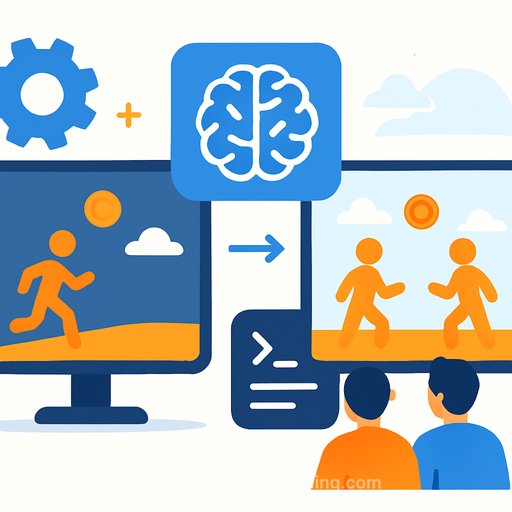AI Video: Codex CLI + GPT-5-Codex turns a single-player game into multiplayer
Date: October 14, 2025, 9:45 pm IDT
Eason Goodale and Romain Huet walk through a practical demo: take a single-player codebase, lay down a multiplayer plan, and execute it end-to-end with OpenAI's Codex CLI and the GPT-5-Codex model. The goal is simple-ship multiplayer without hand-coding every layer. The method is structured, fast, and keeps humans in control.
What the session proves
Clear intent plus AI-assisted code generation shortens the path from idea to playable build. The Codex CLI acts like a teammate: generate a plan, propose diffs, ask for approvals, then run. You still own the architecture and guardrails.
How the CLI session flowed
- Define intent: convert single-player to multiplayer with notes in multiplayer-plan.read.
- Sync context: run codex:get-latest-files and check codex:status.
- Generate the plan: use codex:plan for a step-by-step, code-level implementation.
- Review with approvals: accept or reject diffs before execution to keep changes aligned with standards.
- Execute and deploy: trigger the plan, then test live with two clients in sync.
The approvals feature is the safety net. Goodale calls it "really useful" for working in Codex's sandbox, where you can inspect and confirm changes before they land.
Picking the right model for the job
Model choice matters. Simpler tasks run on faster models; complex, stateful work leans on GPT-5-Codex. As Goodale notes, advanced runs can sustain longer windows, which helps on multi-step refactors and networked systems. The trade-off is speed vs. depth-choose based on task complexity and cost.
From plan to playable multiplayer
After generating and approving the plan, the team deploys. Two players join and control characters with real-time sync-proof that the AI-generated networking, state management, and integration logic works under live conditions. The cycle-plan, approve, run, test-stays tight.
Beyond games: practical uses developers care about
- SRE workflows: investigate user-facing bugs, parse logs, propose fixes.
- Data plumbing: pull from disparate sources, combine, and summarize.
- Operational tasks: fetch information from the internet, switch approval modes, and run repeatable automations.
Practical playbook for your team
- Write the brief: one file with scope, constraints, and acceptance tests.
- Separate concerns: list server, client, networking, and persistence changes.
- Codify gates: require approvals for schema changes, secrets, and deployment.
- Instrument early: add basic telemetry so the model can reason with logs.
- Iterate in small chunks: keep plans granular; run, validate, and roll forward.
- Keep a rollback: scripted revert for each step of the plan.
Risks and what to watch
- Over-trust: always review diffs; treat AI like a junior engineer plus automation.
- Security: restrict credentials; run in sandboxed environments by default.
- Drift: pin versions and record prompts/plans to keep changes reproducible.
- Cost and latency: choose models based on task scope; batch work where possible.
Key quotes
- "We're trying to build a multiplayer game with Codex… and zone back with a step-by-step code-level plan." - Eason Goodale
- "Approvals is really useful… you can kind of get into the sandbox features of Codex." - Eason Goodale
Resources
- OpenAI API documentation
- Google SRE Book (free online)
- Generative code tools: curated picks (Complete AI Training)
- Coding with AI: certification track (Complete AI Training)
Bottom line
The demo shows a clean pattern for teams: define the outcome, let Codex draft the plan, keep approvals tight, and ship. Multiplayer in one session isn't magic-it's process, tooling, and discipline working together.
Your membership also unlocks:






